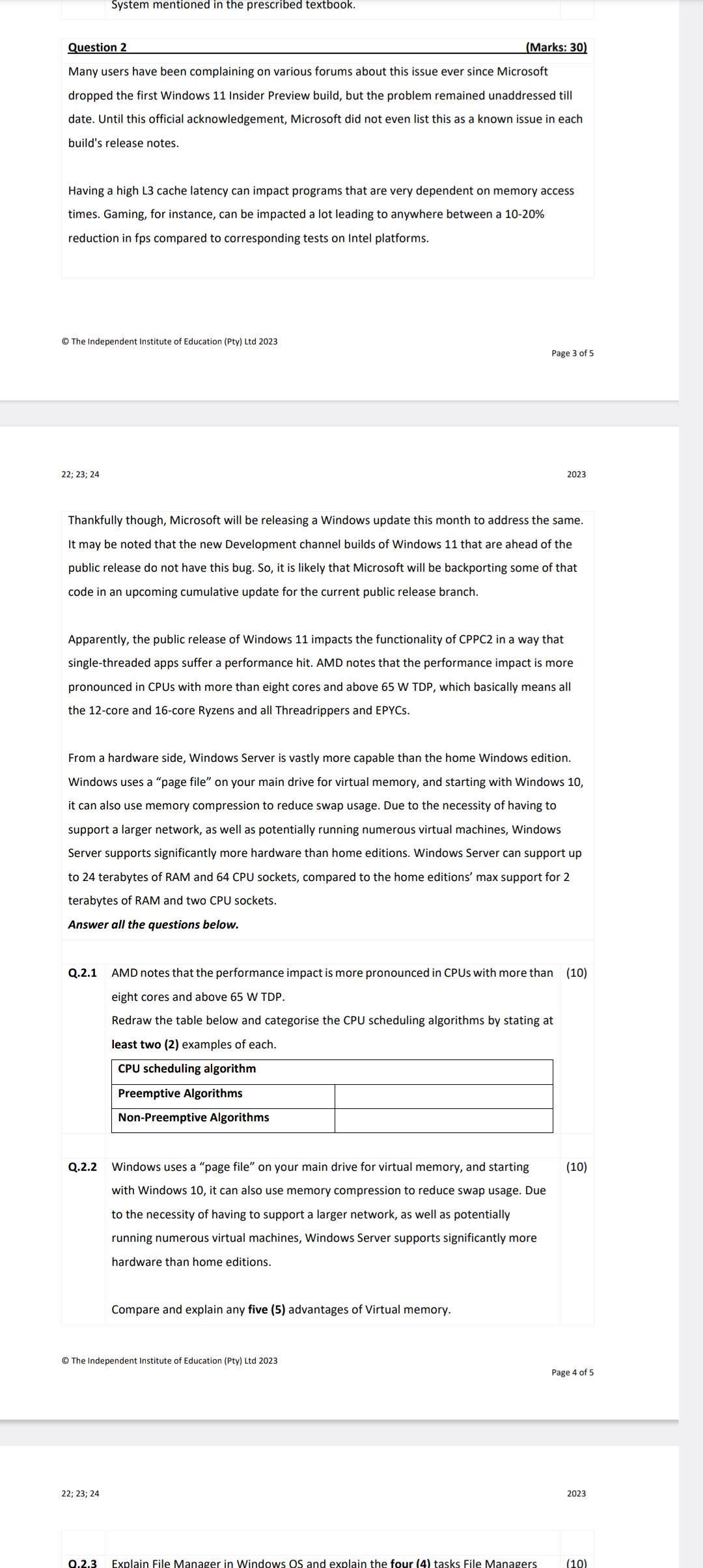Question: System mentioned in the prescribed textbook. Question 2 Many users have been complaining on various forums about this issue ever since Microsoft dropped the

System mentioned in the prescribed textbook. Question 2 Many users have been complaining on various forums about this issue ever since Microsoft dropped the first Windows 11 Insider Preview build, but the problem remained unaddressed till date. Until this official acknowledgement, Microsoft did not even list this as a known issue in each build's release notes. Having a high L3 cache latency can impact programs that are very dependent on memory access times. Gaming, for instance, can be impacted a lot leading to anywhere between a 10-20% reduction in fps compared to corresponding tests on Intel platforms. The Independent Institute of Education (Pty) Ltd 2023 22; 23; 24 (Marks: 30) Thankfully though, Microsoft will be releasing a Windows update this month to address the same. It may be noted that the new Development channel builds of Windows 11 that are ahead of the public release do not have this bug. So, it is likely that Microsoft will be backporting some of that code in an upcoming cumulative update for the current public release branch. Apparently, the public release of Windows 11 impacts the functionality of CPPC2 in a way that single-threaded apps suffer a performance hit. AMD notes that the performance impact is more pronounced in CPUs with more than eight cores and above 65 W TDP, which basically means all the 12-core and 16-core Ryzens and all Threadrippers and EPYCs. From a hardware side, Windows Server is vastly more capable than the home Windows edition. Windows uses a "page file" on your main drive for virtual memory, and starting with Windows 10, it can also use memory compression to reduce swap usage. Due to the necessity of having to support a larger network, as well as potentially running numerous virtual machines, Windows Server supports significantly more hardware than home editions. Windows Server can support up to 24 terabytes of RAM and 64 CPU sockets, compared to the home editions' max support for 2 terabytes of RAM and two CPU sockets. Answer all the questions below. Preemptive Algorithms Non-Preemptive Algorithms 22; 23; 24 Q.2.1 AMD notes that the performance impact is more pronounced in CPUs with more than (10) eight cores and above 65 W TDP. Redraw the table below and categorise the CPU scheduling algorithms by stating at least two (2) examples of each. CPU scheduling algorithm Q.2.2 Windows uses a "page file" on your main drive for virtual memory, and starting with Windows 10, it can also use memory compression to reduce swap usage. Due to the necessity of having to support a larger network, as well as potentially running numerous virtual machines, Windows Server supports significantly more hardware than home editions. Page 3 of 5 Compare and explain any five (5) advantages of Virtual memory. The Independent Institute of Education (Pty) Ltd 2023 2023 Q.2.3 Explain File Manager in Windows OS and explain the four (4) tasks File Managers (10) Page 4 of 5 2023 (10)
Step by Step Solution
3.51 Rating (154 Votes )
There are 3 Steps involved in it
The content provided in the image pertains to a question related to the issues with Windows 11 performance particularly concerning AMD systems CPU sch... View full answer

Get step-by-step solutions from verified subject matter experts


